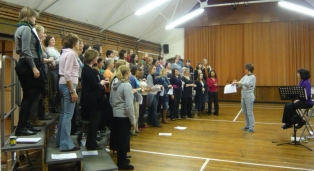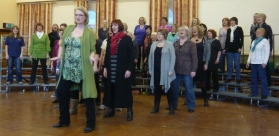 I’ve had several conversations with choir directors over the years about the experience of coming off stage from a performance and having your singers ask you how the performance went. Apparently I’m not alone in finding this a slightly baffling question.
I’ve had several conversations with choir directors over the years about the experience of coming off stage from a performance and having your singers ask you how the performance went. Apparently I’m not alone in finding this a slightly baffling question.
The immediate response is, ‘Well you were there too – what do you think?’ It feels odd to be asked to pass judgement on an experience that the questioner was also participating in. But from the singer’s perspective, of course, it makes perfect sense to ask, since their routine experience in rehearsal is to look to their director for feedback on how they’re doing.
So there’s an interesting difference here between the director’s state of mind in rehearsal and in performance. In rehearsal, you’re using your analytical, or diagnostic ears. The task is not just to perceive what’s going on within the ensemble, but also to articulate it.
In performance, though, this feedback function transmutes into a role that’s much more about regulating than reflecting.






